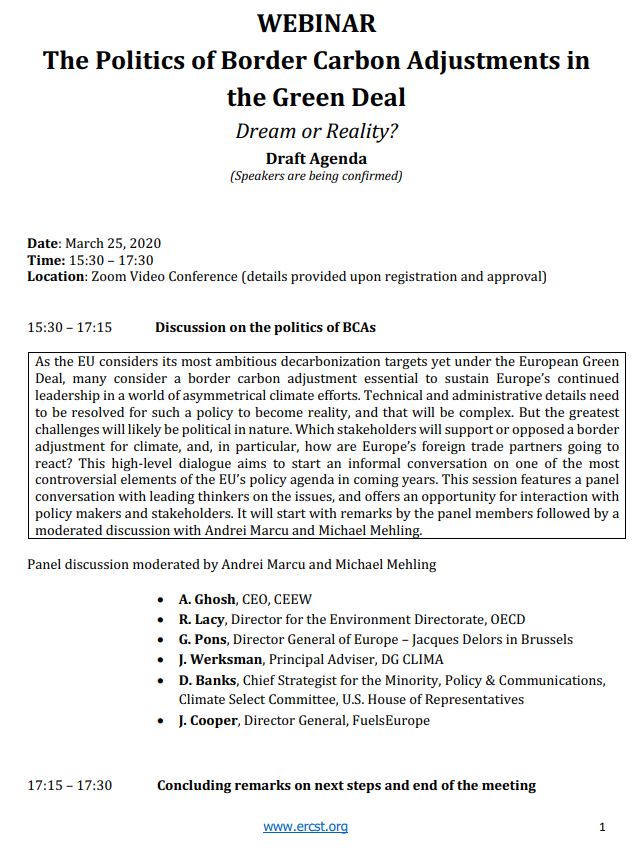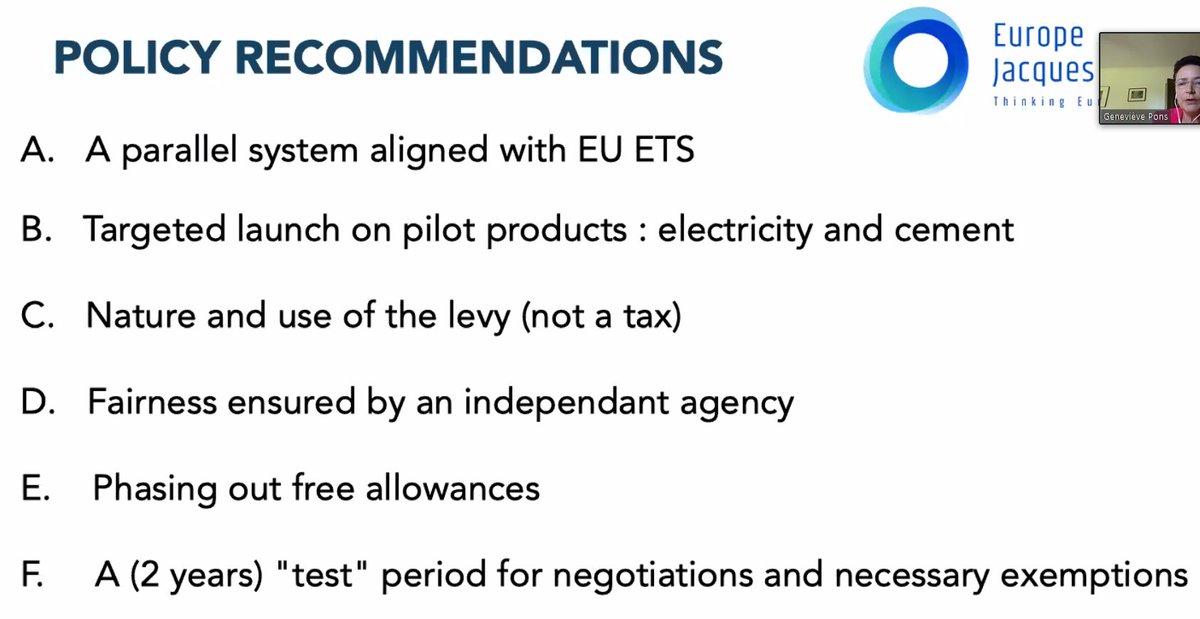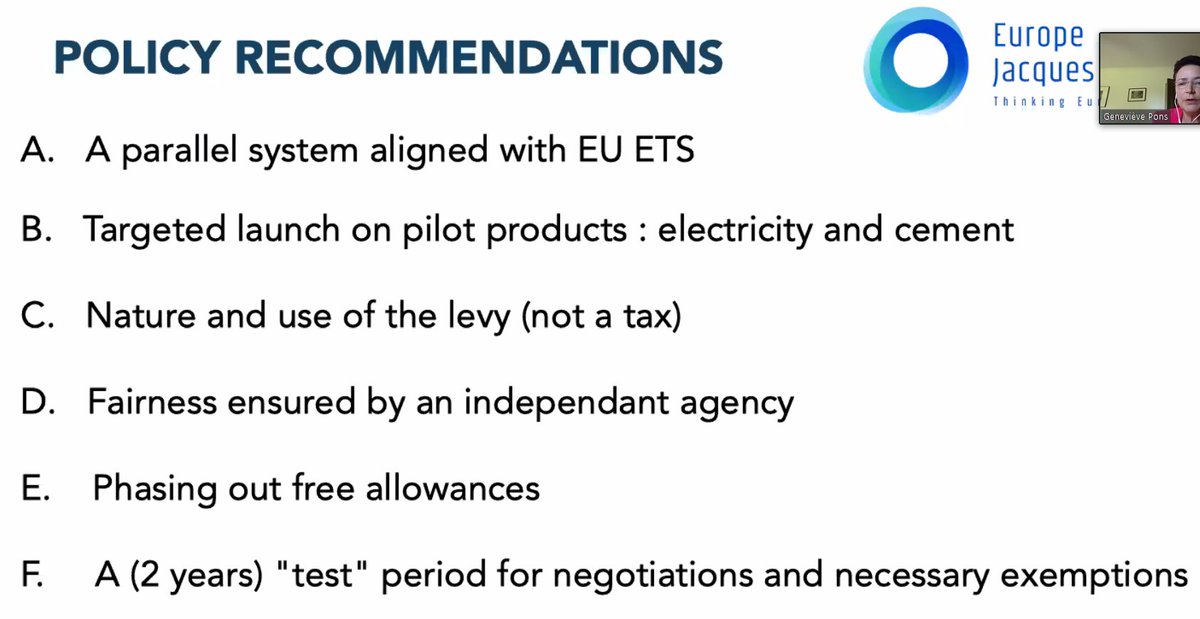- Jacob Werksman - EU Commisson - Ongoing Inception Impact Assessment EU Carbon Border Adjustment
- David Banks - Minority, Policy & Communications, Climate Select Committee, U.S. House of Representatives - Carbon Border Adjustment in the US
- Rodolf Lacy - Director Environment OECD - Insights from OECD on Border Carbon Adjustment
- Genevieve Pons - Jacques Delors Institute - Carbon Border Adjustment
- Panel Debate
- Q&A
..@ERCST_org @mmehling High-Level Webinar: The Politics of Border Carbon Adjustments in the European Green Deal – Dream or Reality? @JamesBacchus @GhoshArunabha @genevieve_pons @delorsinstitute @JacobWerksma started.
Join: https://t.co/4KSEaTbsRd Info: https://t.co/m6rDT3RL56 https://t.co/bpN0g2drLL https://t.co/GljXoATbFS

Jacob Werksman - EU Commisson - Ongoing Inception Impact Assessment EU Carbon Border Adjustment
@JacobWerksman opens the session by announcing an ongoing Inception Impact Assessment on border carbon adjustment (noting that within the @EU_Commission, @EU_Taxud and not @EUClimateAction is responsible for implementation), feeding later in 2021 to @EUCouncil and @Europarl_EN.
Background note: the inception impact assessment is ongoing until 1 April 2020 and available at https://t.co/1PMcmmteDl
@JacobWerksman further noted that the ongoing inception impact assessment focuses on:
A: Policy instruments and associated effects (tax, custom duty, ETS experience, etc..)
- Methods to evaluate carbon content of products (benchmark values, …)
- Sectoral scope
..
B: Revision of existing policies (energy tax directive, …) C: Data: past ETS experience, effective tax rate from other jurisdictions, …
Questions from my side (hopfully a reply soon..)
- Which data are currently considered to be used for emission rates of imported goods?
@richardw_ntnu @kst_stadler provide data https://t.co/LvgaAXF77T (zenodo : https://t.co/0OqjXtu7Sn) on country and region-level aggregates + accuracy analysis.
- Do you @JacobWerksman @EUClimateAction - in addition to looking at tax effectiveness - also plan to look at or enforce specific product norms and standards? Considering price signals don’t guarantee a required impact or effect, norms and standards seem a more reliable
David Banks - Minority, Policy & Communications, Climate Select Committee, U.S. House of Representatives - Carbon Border Adjustment in the US
[2] @mmehling asks David Banks whether measures taken in the EU are also considered in the United States?
-
Early support for unilateral emission cuts. Republican response was: this will kill economy.
-
Some early debate on leakage, democrats/republicans agreed there would be.
-
Carbon adjustment is needed. This debate is still present, in a rising economic nationalism (not only @realDonaldTrump administration).
-
Current thinking: carbon loophole needs to be closed if we want to have any success in curbing emissions.
-
Currently moving from production-based to consumption-based accounting. This would imply for the US that emissions would be at least 10 % higher. But there is a political narrative for lower carbon intensive domestic production.
-
Carbon border adjustment should not have the opposite effect, undermining global climate agenda.
-
How do we find a good balance between protectionism and international trade, that will help global emission reductions?
Rodolf Lacy - Director Environment OECD - Insights from OECD on Border Carbon Adjustment
[3] @mmehling asks @RODOLFOLACY @OECD whether there is a particular advice or recent insight on how the EU could use carbon border tax adjustment?
@RODOLFOLACY: We import cheap fuels and products from countries with less stringent and ambitious regulations.
“Carbon pricing/leakage debate became more sophisticate. Earlier we focused too much on end of pipe emissions, not considering global supply chain interconnections. #CircularEconomy approach is necessary. “
“Empirical evidence suggests that there has not been significant carbon leakage. Maybe because policies have not been strong enough. Only for a few specific products (steel, cement, aluminium).
Therefore, ambitious climate action require additional policy instruments.”
Genevieve Pons - Jacques Delors Institute - Carbon Border Adjustment
[3] @mmehling asks @genevieve_pons @DelorsInstitute to share main takeaways of ongoing work at @DelorsInstitute and it’s relevance to the work of the EU.
@genevieve_pons reiterates that she fought for carbon taxation (successfully in @EU_Commission, unsuccesful in @EUCouncil).
…resulting in the EU ETS, of which the price plunged now because of the #COVID2019 crisis.
“Discussion on border carbon adjustment has long be a theoretical one. It can no longer be a theoretical one, as @vonderleyen announced EU action. “
“In order to deal with crisis, we need a significant carbon price and we need to be carbon neutral in 2050. For this, we need a significant carbon price signal.”
What does this mean?
“For certain intensive industries, if they are alone to face this price, the result will be carbon leakage”
“We should measure emission of consumption, not production. From this we know that emissions have not reduced, as imported emissions = +-30 %”
“This means that a border carbon adjustment mechanism is needed, to avoid an increasing imported emission percentage (refers to work with @JacquesDelors).
@genevieve_pons @DelorsInstitute propose:
- Using ETS experience
- Start with electricity/cement (= intrinsically local) … https://t.co/l9EsipRoT2

(mentioning that electricity sector mentioned in the @OECD that they experience carbon leakage).
- In accordance with @wto rules, we need to phase out free allocation of emission allowances
- Propose 2 year trial to negotiate with main trading partners https://t.co/kiEKcnefE8

Panel Debate
[4] Andrei Marcu @ERCST_org moderating the panel debate.
Q to @JacobWerksman : what did change in the meantime, focusing on civil aviation?
A: “Paris agreement is most notable change. In civil aviation, the proposal to put a cap on civil aviation emissions with certificates”
“In process of preparal of propsal (2021) for adopting regulation on how to incorporate developments in @icao in EU ETS. We already have measuring and verification systems in the EU that are necessary to operate effectively. Other instruments are under investigation.”
“CORSIA pilot phase has just been approved, which includes a set of sources of offsets, and a vintage year (pre-2020 to post-2020 carry over).”
“Both CORSIA and EU ETS have proven controversial, of extra-territorial effect. They both reach beyond physical borders.”
[4bis] David Banks, speculation on US election results in November 2020. Notes that @JoeBiden mentioned carbon border adjustment in his speeches and programme, and that the US should engage earlier in bureaucratic process with EU, instead of retaliating later in the process.
“Everyting depends on the team present in the administration. If the team of @JoeBiden engages, there is a higher probability for earlier engagement with the bureaucratic process in the @EU_Commission “
[4bis] @GhoshArunabha iterates that “10 % of @wto disputes were related to energy and climate policies and measures”
@GhoshArunabha “4th element is measurement and data issues. Until we have clarify on that, there will remain opposition”
@RODOLFOLACY : “We [from Mexico] are trading avocado’s and other products with the US. A part of the climate action reserach in california was carbon border adjustment. We have to take into account that the Mexico that industrial situation is very peculiar in border region”
Q&A
Question on global cooperation versus national and regional action
[4bis] If global cooperation, as portrayed by @genevieve_pons, would not work, would there be a chance for industry-specific policies?
“Many industries are globally interlinked. If policies are seen as punitive, it is in everybody’s interest to portray policies advantageous”
Question on target definition and sectors
[4bis] Question @danielestenson: how are measures defined ? (targets, ) and what criteria would one use when deciding on carbon border tax?
@RODOLFOLACY : we need to start with key energy intensive sectors.
@JacobWerksman : we need reliable data, in terms of policies the approach is more open (could include tax, tariff, expanding ETS).
First and foremost, policy objective should be clear.
[4bis] @ClaireTutenuit: we need to reduce carbon footprint of Europe (both territorial and consumption-based foreign emissions).
Question on data for policy
[4bis] myself to @JacobWerksman @EU_Commission : do you already have datasets in mind? And more specifically: do you intent to consider using input-output datasets?
- recent example of a paper https://t.co/K7qWBXv9do
Question on product norms and standards
[4bis] 2d question of myself: are product norms and standards also considered in border carbon adjustment policies?
A @JacobWerksman : this is to be collected through public inception impact assessment.
Answer @JacobWerksman : they are absolutely included (automobile, fuel-related, …). These are an important part of gaining access to European market. As we revise the legislation to achieve a more ambitious target, we will be looking at product standards as well.
Question on protection of European industry
[4bis] Andro Moldre to @JacobWerksman : how would you protect European industries that export?
John Cooper @FuelsEurope : there is only a small amount of fuels that exported by European refining sectors (surplus gasoline, because of excess diesel vehicles).
Question on perception on carbon border debate in India
[4bis] What is the perception in India on carbon border adjustment debate?
A @GhoshArunabha : india is on track with NDCs within Paris agreement, produces more renewables than the USA. There should be some mechanism to reward this.
[4bis] @genevieve_pons : “It is important to keep the objective in mind (avoiding carbon leakage), and reduce emissions on a global level. This will guide our answers to more technical questions (for example: how to calculate adjustment mechanism). “
@genevieve_pons “For example, the CO2 price: It is not only pricing, but also the accompanying regulations”
“Carbon border adjustment is part of toolbox, in addition to: greening trade agreements and market incentives and policies. We should use our market power to raise norms”